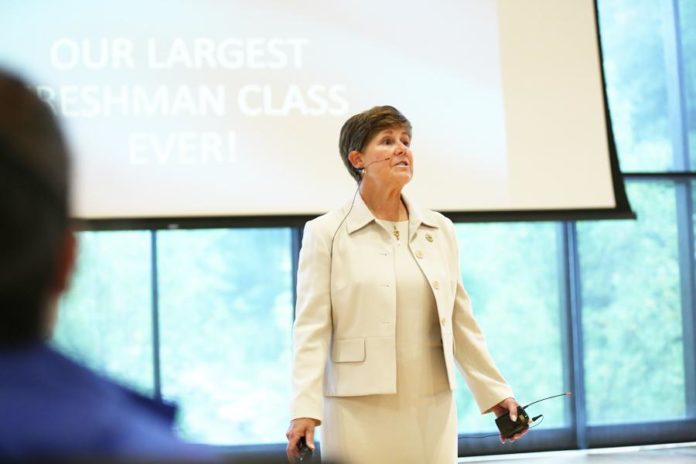“I’m so happy, so happy that last year is in the rear-view mirror,” Slippery Rock University President Cheryl J. Norton said in her state of the university address, reflecting on the 2013-2014 fiscal year Thursday in the ballroom of the Robert M. Smith Student Center. The budget was balanced “with a great sense of pride and being very humble to all of you” by Norton and with $262,135 in the black.
While no reserve funds were used to fund operations, they were used for health, safety and deferred maintenance costs. “We did a good job, but we’re not doing more than what’s needed in terms of addressing that problem because we’re trying to maintain momentum for the future,” Norton said.
She cautioned that while the $262,135 may sound like a high number, it is less than 0.25 percent relative to the total budget- a budget that Norton expects to be on the rise for next year.
Next year will bring the highest year of costs for collective bargaining agreements and merit pay due to it being the final year in many of the contracts, a 4.25 percent increase in health care costs for the most popular plan (lower than expected last year), pension plan increases and operating costs that will continue to increase.
It also brings the fourth year of a flat state appropriation from the governor’s budget to the Pennsylvania State System of Higher Education (PASSHE). “In reality, even though it’s a state appropriation, it does not necessarily buy the same thing this year as it did last year or the year before. We’re really down 10 to 12 percent,” Norton said.
“Fortunately, and I do mean fortunately, the Board of Governors saw fit to give us a three percent tuition increase,” Norton said which brought in money to save 37 staff positions. The Board of Governors also approved technology fee increases to be used for new services and technology.
The over 2,200 freshmen and transfer students entering the university this year represent the largest freshman class in its history and a one percent increase in credit enrollment overall for the university. While the numbers have not been fixed, there is a 12.3 percent increase in freshmen students, 29 percent increase in international students, 21 percent increase in graduate students, and a transfer decrease of 2.25 percent are expected.
“We’re one of three PASSHE schools that have actually shown an increase, how great is that?” Norton said.








